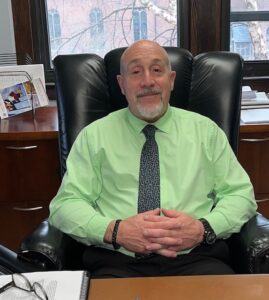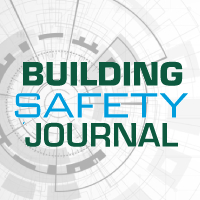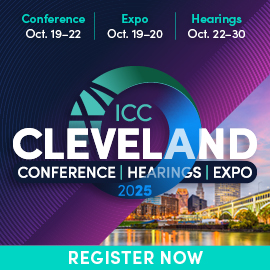
International Code Council member William Forte
International Code Council members like William Forte are the individuals behind codes and safety; ensuring building safety today and working for a stronger tomorrow
Code professionals ensure building safety today, for a stronger tomorrow. As the individuals behind modern codes and standards, these professionals are responsible for ensuring the safety and compliance of codes and standards, shaping the safety of the world around us, and serve as the safety foundation for our buildings. They don’t just ensure that buildings are constructed to withstand the stress of everyday use, they are behind the security and stability of every building. They specialize in preventative measures to help communities weather unforeseen natural disasters and ensure that first responders have less to worry about and can do their jobs safely. Code professionals are an essential piece in the building and construction puzzle and are engaged in the building process from the initial building plan to the finished product.
The International Code Council is a member-focused association with over 64,000 members dedicated to developing model codes and standards used in the design, build and compliance process to construct safe, sustainable, affordable and resilient structures. They protect the public through their commitment to building safety; enforce code compliance to empower and educate stakeholders across the built environment to embrace and integrate safety standards in their work; support economic development by making our buildings sturdier, and therefore longer lasting. Their knowledge, skills, and abilities impact every building, in every community.
The Code Council recognizes the importance of continuing to grow awareness of the important work that code professionals do and the impact they have, in the hopes of encouraging aspiring building safety professionals to join in on the building safety movement. In this exclusive feature for the Building Safety Journal, we asked William Forte to share his experience in the industry, highlights of his professional career, and any insights or advice he has concerning the industry and the future of building safety.
William Forte, CBO
Inspector of Buildings/Superintendent of Public Buildings
City of Waltham Building Department
Waltham, Massachusetts, United States
International Code Council member for 10 years
 BSJ: What was the path to your career — how and why did you pursue a profession in building safety?
BSJ: What was the path to your career — how and why did you pursue a profession in building safety?
Forte: I first started in high school but did not pursue a career in construction until I built the house I now reside in. While my house was under construction, the events of September 11 (9/11) occurred. I believe that day inspired me to enter the profession I am in now, although I did not know it at the time. The Station Night Club fire in 2003, where 100 people perished, opened my eyes to the importance of building safety.
BSJ: What three things do you need to be successful in this industry and in your profession?
Forte: I find that the ability to listen before you speak is the most important thing. Oftentimes, we jump to conclusions without a thorough investigation of the facts, which may cause undue hardship to a stakeholder. Always be eager to learn from people who know more than you. It is more important to ‘get it right’ than it is to ‘be right’. Also, having the ability to listen to your team. Each of us is focused on a different aspect of a code, so when making a determination, having a team behind a decision helps to solidify the department’s function as a whole. It is vitally important to be thorough and consistent when enforcing the code, especially when people’s lives are at stake. Finally, having empathy for people on the other side of the counter is essential. Putting yourself in their position and listening to their needs. Common sense should always prevail without minimizing the importance of following regulations. Remember that you are a public servant first. It is much more important to provide a pathway to compliance, rather than a roadblock.
BSJ: What role have mentors, advisors or your network played in your career?
Forte: My mentor is John Lojek, commissioner of inspectional services for the city of Newton in Massachusetts. I was the code enforcement officer for the city from 2012 to 2015. John taught me the aspects of department administration and helped me to navigate the political pitfalls that can present difficulties in a large city. Everyone has something to teach me if I am listening. John helped me to lay a solid foundation in my career path. Also, Bob Curran, the building commissioner in Whitman, encouraged me to study and become a certified building official (CBO) when I was a general contractor. He takes his job seriously and made it look interesting.
BSJ: What led you to become an ICC member?
Forte: It was required as part of my certification in Massachusetts. When I was taking my exams for CBO, there were no in-person classes being offered locally so I used the online university to study for and pass the exams.
BSJ: Are you involved in any ICC committees or councils? Do you have any ICC certifications?
Forte: I have been certified as a CBO since 2012. Waltham is so busy, I do not have the time to be involved, although I would like to. I do teach the Construction Supervisors Prep Course on my own time for a private company, and I find it very fulfilling. Teaching also enhances my professional development. I also perform educational seminars for my piers at the Southeastern Massachusetts Building Officials Association (SEMBOA) when I am asked to.
BSJ: How long have you been in the industry?
Forte: Twenty-five years.
BSJ: What major changes have you seen?
Forte: In Massachusetts, there is a huge demand for R-2 multi-unit housing, which has really pushed the limits of wood-frame (Type IIIA) construction. This is concerning to me, due to the Cooper Street fire in 2017 here in Waltham. (The second-largest construction fire loss in the U.S. in 2017.) There should be temporary fire suppression protection regulation on combustible buildings while under construction. System design for temporary sprinklers should be codified as a reference standard.
On a more positive note, there is an unprecedented number of life science buildings being constructed and renovated in my jurisdiction. Mechanical systems are more complex than ever and require expert oversight. Type I construction in these buildings has become the norm. In Waltham alone, there is currently two million square feet of new building under construction for life sciences and at least that many square feet in the renovation of older office buildings. Waltham has become a central hub for research and development in the northeast.
The single and two-family house market here in Massachusetts is in high demand. The International Residential Code (IRC) has taken on a life of its own. Every time I teach a CSL class with the IRC, I learn something new. Through the misfortune of widespread natural disasters, single-family homes have become safer by virtue of higher construction standards.
The International Energy Conservation Code has also taken precedence as a stand-alone code. Buildings are more energy-efficient than ever before. We issue more than 125 solar permits for existing residential homes every year. Although a green initiative is costly upfront, the benefits thereafter pay high dividends, not only economically, but ecologically as well.
BSJ: What excites you about the future of your industry?
Forte: What I do today, matters in the future. Computer technology has made the industry much more efficient. Our plan storage is 100-percent electronic. The fact that most states have adopted the International Code Council’s family of codes ensures that life safety is not an option and that all U.S. cities and towns are making safer, more resilient buildings to live and work in.
BSJ: What is one piece of advice that you would give to those starting out in the industry?
Forte: Where do I begin! First, authority is like medicine; never use more than the prescribed dose. Be sure to have all the facts before you make a decision or determination. Take your job seriously, as if your life depends on it (or someone else’s life). Listen to others and seek support when you do not know the answer. Be professional, look professional, act professionally. With all of the support that is out there, you never need to be alone. Being the building safety officer is a ‘larger than life’ responsibility, so treat it that way.
BSJ: What do you see as most surprising about the work that you do?
Forte: I am surprised at how many stakeholders are satisfied when they get the right information, even when the pathway to compliance is difficult. I find satisfaction in reaching common ground with many who resist doing the right thing at first but come to see the benefits. It brings peace of mind to all when everyone is safer.
BSJ: What would you like to do next in your professional/personal life?
Forte: I have excellent public speaking and presentation skills (shameless plug) and I would like to use them to present for ICC when I have more time to study and get more familiar with the material. See you in 10 years!
BSJ: What do you enjoy doing in your leisure time?
Forte: I like camping (glamping) and riding my Harley Davidson [motorcycle]. I enjoy cooking, eating and the beach. I love being a number one dad and husband and helping others.
If someone wrote a biography about you, what do you think the title would be?
Forte: “Out from Under” — I worked very hard to get from being a blue-collar construction worker with a high school education (barely) to becoming in charge of one of the busiest building departments in the Commonwealth. It is a privilege to serve the public in this capacity.
There’s a world of opportunity in being a member of the International Code Council. Membership provides the tools to get the most out of each workday: from discounts on essential International Codes and other publications to the best prices on top-quality training and ICC certification renewals, Code Council membership helps budgets go further. Exclusive member benefits include code advice from expert technical staff as well as access to member-exclusive news and articles at the Building Safety Journal news portal. Plus, only Code Council members vote in the ICC code development process. An online Career Center allows job postings and searches for new job opportunities — all at no additional charge.
The Code Council offers numerous councils, committees, and resources to help code professionals grow and network with colleagues. Six discipline-specific Membership Councils offer members a place to come together and be a more powerful force in shaping your association, your industry, your career, and your future. Code Development Committees are an instrumental part of the ICC code development process and are responsible for the review and evaluation of code change proposals submitted to the International Codes. Professional Development Committees serve to better align the ICC education programs and certification programs to ensure that quality training is available to meet the needs of all members, customers and certification holders. Finally, the Value of the Code Official toolkit helps members to heighten awareness of the importance of code officials to their communities and to highlight the code official’s role as a helpful advocate for community safety, health and welfare, and economic development.
To learn more about ICC membership, click here, or contact ICC Member Services by email or 888-ICC-SAFE (888-422-7233) ext. 33804.








